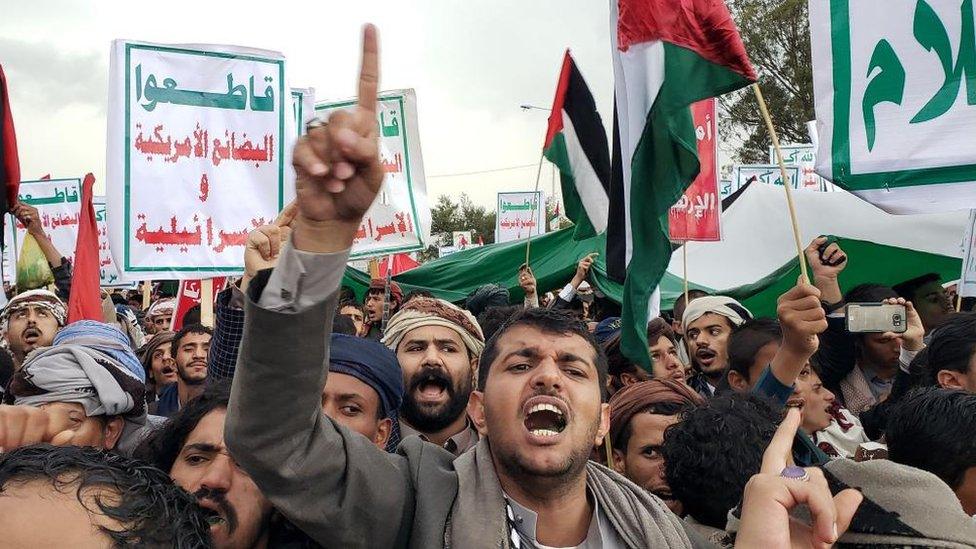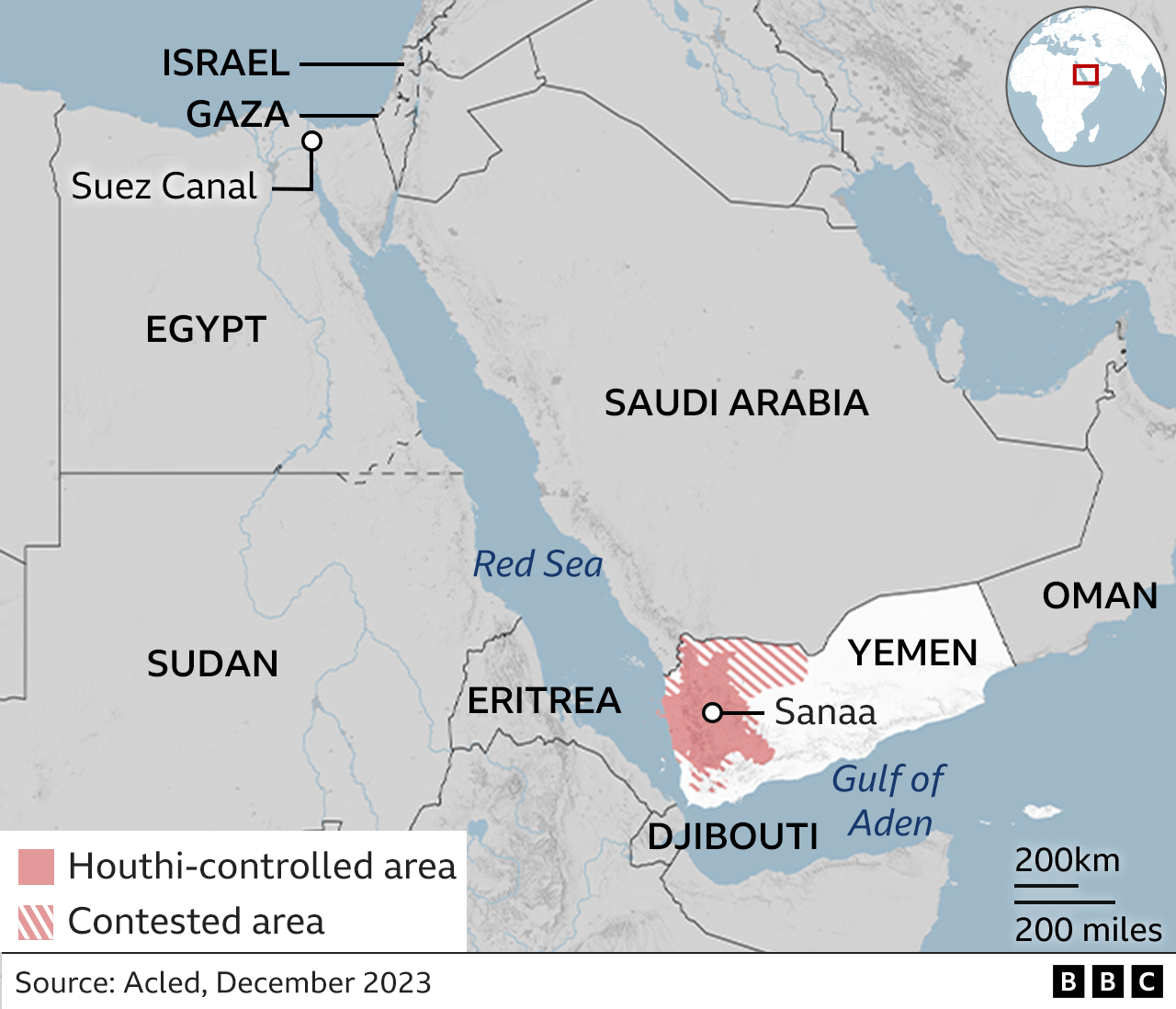Understanding a week of missile strikes across Middle East
- Published

The past week has seen new rounds of violence across the Middle East, deepening fears of conflict spreading in an already unstable region.
Here is a brief guide to what has happened - and where it might lead.
IRAN-PAKISTAN
On Tuesday, Iran unexpectedly carried out a missile and drone attack on Pakistani territory. Iran said it was targeting an Iranian Sunni Muslim militant group, Jaish al-Adl, that has staged attacks inside Iran. Pakistan said two children were killed and swiftly hit back, launching missiles at Pakistani "terrorist hideouts" on Iran's side of the border. Iran said three women, two men and four children were killed.

The flare-up has heightened tensions in a region already experiencing a multitude of crises. Although the area of the tit-for-tat strikes is far from the main theatres of fighting in the Middle East, the border is volatile and further incidents here could quickly escalate, for instance if Jaish al-Adl retaliates against Iran.

YEMEN AND THE RED SEA
This week saw multiple rounds of US Navy missile strikes against the Houthi Zaidi Shia movement in Yemen, following Houthi attacks on shipping in the Red Sea, a waterway crucial to world trade. The Houthis - backed by Iran - stepped up their attacks in November following the outbreak of the war in Gaza. They vowed to target "Israeli-linked" boats so long as Israel's offensive continued, to show solidarity with the Palestinians.
Consequently all merchant shipping in the international waters has been put under threat, something considered intolerable by Western powers. The US and UK, backed by allies, launched the first air strikes against the Houthis last week to try to deter them - but the group has remained defiant.

On Monday, the Houthis hit a US vessel in the Gulf of Aden in what appeared to be their first successful attack on an American ship since their campaign began. A second was hit in the Gulf of Aden on Wednesday and the Houthis have vowed to continue - raising the prospect of further US strikes and the question of whether Iran will feel forced to respond.

ISRAEL-HEZBOLLAH-IRAN
An increasingly intensifying years-long shadow war between arch-foes Israel and Iran ratcheted up on Monday when Iran fired missiles at what it described as headquarters of Israel's Mossad spy agency in Irbil in Iraq's semi-autonomous Kurdistan region, killing four people. Iraq - an ally of Iran and hostile to Israel - denied Mossad was there and condemned the attack.
Iran said its attack was a response to the alleged Israeli killings recently of a senior Iranian commander in Syria and two top Iran-backed militants in Lebanon - one a commander of the Shia militant movement Hezbollah and the other the deputy leader of the Palestinian group Hamas.
The Israel-Lebanese border, where Israel and Hezbollah - heavily armed and funded by Iran - have frequently traded strikes since the Hamas attack on Israel and start of the Gaza war on 7 October, is one of the most dangerous fronts in the region.

On Wednesday Israel's military chief of staff said "the likelihood of [war in the north] happening in the coming months is much higher than it was in the past."

IRAN-ISLAMIC STATE GROUP
At the same time as it struck in Iraq, Iran fired missiles into a rebel-held province in north-west Syria, saying it had targeted bases of the Islamic State (IS) group in retaliation for IS suicide bombings in southern Iran on 3 January which killed 94 people. IS, a Sunni jihadist group, considers Shia Muslims heretical, and Iran is the dominant Shia power in the region.
While Iran is a key ally of the Syrian government, directly striking militants in the rebel-held region is a rare step and a signal to its adversaries that Iran is prepared to act far afield.

ISRAEL-SYRIA-IRAN
An air strike on the Syrian capital, Damascus, on Saturday killed 10 people, according to the Syrian Observatory for Human Rights. Five of them were senior members of Iran's elite Islamic Revolutionary Guard Corps.
Syria and Iran blamed Israel, with Iran vowing revenge.
It follows similar strikes around Damascus earlier in the week. Israel has not commented, but has previously acknowledged carrying out hundreds of aerial operations in Syria involving attacks on targets it says are linked to Iran. An interception of a fighter aircraft by Syrian air defences - which has so far not happened - or deadly retaliation could ignite a new crisis in a region beset by wars.

ISRAEL-GAZA
Intense fighting between Israel and Hamas in Gaza has continued, with the war there now in its 15th week. At least 891 Palestinians have been killed by Israeli bombardment since last Sunday, raising the death toll there since 7 October to more than 25,000, according to the Hamas-run health ministry. On the Israeli side, nine soldiers were killed in the same period, bringing its combat death total to 189.
Israel intensified its offensive on the southern city of Khan Younis this week, while troops reached their furthest point south since the start of the war, the Israeli military said. Meanwhile Israeli Prime Minister Benjamin Netanyahu said the conflict could go on until 2025, Israeli TV reported this week.
Israel was also hit by a car-ramming and stabbing attack on Monday, for which police arrested two Palestinian suspects from the occupied West Bank. The attack, which was praised by Hamas, killed a woman and injured 17 other people. It was one of the first such attacks inside Israel since the start of the Gaza war, heightening anxieties among Israelis still reeling from the 7 October attacks.

Violence has also escalated in the West Bank alongside the war. Israeli air strikes there on Wednesday killed nine Palestinians, medics said. Israel said at least five of the dead were planning an imminent attack.

COALITION FORCES IN IRAQ
Missiles were fired at an air base used by US-led coalition forces in western Iraq on Saturday, injuring several US military personnel, US Central Command said. Iranian-backed militants are suspected of being behind the attack.
Bases housing US and coalition forces in Iraq and north-east Syria have been attacked dozens of times by Iranian-backed militants in recent months, drawing US retaliation. The attacks are seen as part of Iran's indirect conflict with the US, where it can strike US assets at arms length.
About 3,400 coalition personnel are in Iraq and Syria as part of efforts to prevent a resurgence of the Islamic State group, which still operates in pockets in the region.

OTHER ARENAS
Attacks by one country into another have also been happening in other places in the Middle East this week.
Turkey carried out air strikes against Kurdish militants in northern Iraq and a US-backed Kurdish-led militia alliance in northern Syria on Monday, its defence ministry said. The latest strikes are part of a decades-long and bloody conflict between Turkey and armed Kurdish groups which Turkey, which has a large Kurdish minority, regards as terrorist organisations. One of the strikes is reported to have hit a prison holding more than 3,000 IS prisoners.
There were also rare air strikes by Jordan across its border with Syria. Ten people, including children, are reported to have been killed. It is thought to have targeted drug smugglers. Iran-backed militias in Syria have been accused by Jordan of trafficking the amphetamine Captagon into the kingdom and on to Gulf Arab states.